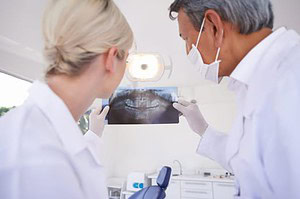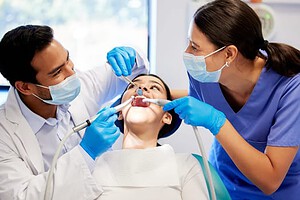Addressing high staff turnover in the dentistry industry, specifically dental nurses. Why are they often leaving the profession?
Are you wondering why there is a shortage of dental staff across the UK? Or why dental staff in your practice are often leaving? This report offers greater insight on the issues within the dental industry which contribute towards dental staff/nurses leaving their jobs.
There is absolutely no doubt about the fact that there is a generously high turnover within the dental nurse workforce. The 2022 Dental Economics Survey gives us an insight into the figures regarding dental staff leaving their roles: ‘65% of dental practices were seeking to hire one or more staff members in 2022.’
This allows us to see the problem at hand in regards to dental staff often leaving, which makes us question why?
As a dentist it is important to understand the root cause for high staff turnover and what implications this has on your business. At the end of the day, no business owner wants to experience a constant cycle of staff leaving.
Unfolding all the potential reasons behind a high staff turnover in the dentistry industry can allow the real issue to be identified and addressed. This also helps prevention strategies to be put into place within the business.
Starting with the basics, why are dental staff leaving?
Work to pay ratio
Firstly, staff turnover could be the result of wages not adding up to the amount of hours staff are expected to work. Many dental practices pay their DNs lower than what they should be getting for their responsibilities, this could lead to uncertainty about remaining in dental nursing.
According to the government and by law the job of a dental nurse is classed as a profession, however it can be argued that the pay does not correlate. This highlights the unfair truth DNs have to experience in their career.
Not only does this role offer little opportunities for growth, but it is widely recognised that dental nurses are underpaid and underappreciated massively. With having studied for years at an expense, given many responsibilities and working all day on their feet, these nurses are greatly underpaid for what they have done to achieve this role and what the role consists of.
If we compare private dental nurses to NHS dental nurses, we are able to see the drastic pay differences. According to talent.com the median salary a private dental nurse is just below £25,500. This is statistically the average earnings, with entry-level salaries starting at £23,400.
For NHS dental nurses, starting salaries begin at around £25,200. This increases throughout the years to form an average of around £28,275 per year, according to indeed.com. Just by looking at these salaries we can understand the differences, recognising the frustration private DN’s may feel as they are aware of this.
Lack of career growth/ pay rises
With the majority of dental nurses seeing no pay progression or career growth in the role, feelings of frustration could form for dental staff which could ultimately lead to them leaving their role.
It is said that dental nurses are also almost sold a lie whereby if they were to pay for ‘post registration qualifications’ they have a chance of being able to progress with increased amounts of pay; however, there is no evidence to prove this is the case.
Meaning and growth can come hand in hand with this role, therefore if there is no potential for growth there is no meaning or importance for these dental nurses to stay in their role.
High workload
Dental nurses’ role naturally requires many responsibilities, however this can become overwhelming for them to deal with at times. For some dental nurses, having such a high workload can create tense feelings of anxiousness, creating a level of stress which is hard to deal with in the workplace. This is also influenced by their relationship with co-workers in the practice.
Dental nurses often work alongside dentists of high demand with no people skills, where they may often feel lonely as most patients tend to speak to the dentist leaving the nurses in the background setting up. In regards to pay, dental nurses may have the urge to leave as a result of them not seeing their wage worth dealing with work-related stress on a daily basis.
Recruitment time and money expenses
It costs a dental practice time and money when hire new people. Dental practices should be factoring this within their planning to effectively hire good staff and give them the training they need to work effectively.
Inadequate training for new staff could be the reason for dental nurses leaving their job. New staff may feel as though they haven’t been trained properly, perhaps feeling ignored and unmotivated in their workplace. ‘Professional development opportunities’ should be implemented by dental practices to allow employees to perform to the best of their ability.
Benefits
Nurses tend to receive basic benefits such as annual leave, which is mandatory and most may receive free or reduced dental care. Compare this to other industries where employees can receive health, wellbeing and social benefits through services such as Perk Box.
This has a massive impact on retention as well as mental well-being, especially if a mental health helpline is included with the Perk Box service. The lack of benefits which dental staff are receiving may contribute to them leaving the profession.
For dentists, what impact does dental nurses leaving have on the practice?
Loss of income and profits
It is highly advised by the General Dental Council (GDC) that patients should always have a chaperone present such as a dental nurse. Having a high turnover of dental nurses within your practice could create an overall backlog in the flow of your business.
In other words, fewer patients, less income for the business and more focus goes into recruiting dental nurses and training them to be at a good, professional standard. This issue is huge in itself as less income can impact not only the business but also personal life and financial freedom.
Trust and relationship management
Relationship breakdown between customers and staff can come as a result of dental staff leaving a practice. If there is a high staff turnover, patients may not feel comfortable sharing information about their dental history. Especially if they have already opened up with previous staff members, keeping information to themselves may become more regular for patients.
Due to this, inconsistencies in communication can also be created between patients and new staff. In some circumstances, this could decrease the customer base of practice as customers could perhaps not trust new staff which could create feelings of frustration for patients.
Recruitment time and money expenses
On the flip side to what has been mentioned previously regarding hiring expenses, if staff turnover wasn’t so high in dentistry, the funding and extra time required for the hiring process wouldn’t be needed. Ultimately practices are losing income and time with patients due to having to spend it on finding, hiring and training new staff.
This may also result in not giving adequate time to vetting and interviewing nurses as most practices may not do their full due diligence because of the lack of time. As they say, hire slow, fire fast.
Overcoming and reducing staff turnover in dentistry
There are many factors which can contribute to and prevent a fast turnover in staff in the dental industry. Working well within a team is something which can be underestimated and plays a crucial role in developing and strengthening your dental practice.
To read on how to strengthen your dental team click here.
Amongst this there are other factors which a practice can consider when thinking about dental staff leaving and how to reduce this. Some of these are:
- Setting staff a manageable workload and understanding the importance of balancing work and life.
- Recognition of hard work from staff and rewards to use as incentives.
- Aligning their life goals with your business goals. After all, they are people with feelings and personal aspirations.
Conclusion
Any workplace can agree that a high staff turnover isn’t ideal, with dentistry this could massively impact a practice. Understanding the reasons why dental staff in your practice are leaving is crucial to be able to move forward with preventing this.
With a greater understanding of staff turnover you will be able to use this to your advantage in the future, helping to maintain a strong team in your practice.
Knowing why your dental nurses are often leaving your practice also allows you to be able to pinpoint areas of improvement and understand the specifics of what could potentially be the reason for the shortage of staff.
By learning this, you will be setting your team up for upward growth and success in the future, creating a safe and motivating workplace for patients to feel welcome.
To read on how to strengthen your dental team click here.






